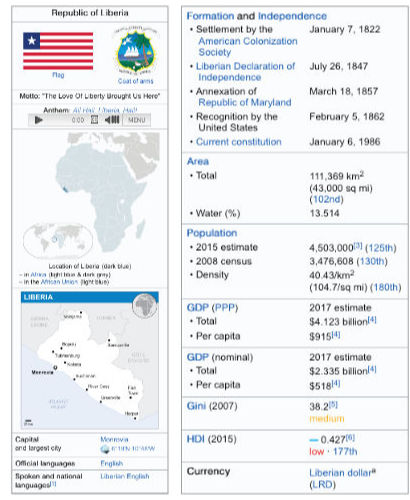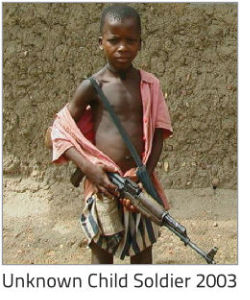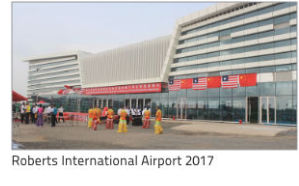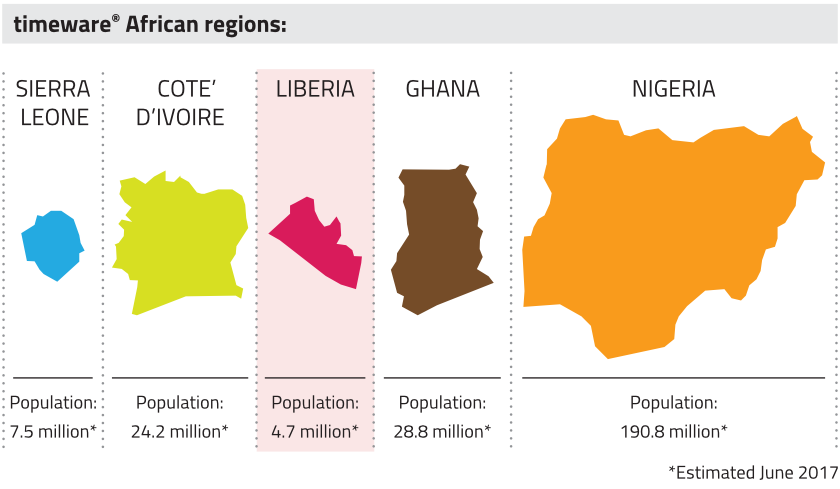 Liberia, officially the Republic of Liberia, is a country on the West African coast.
Liberia, officially the Republic of Liberia, is a country on the West African coast.
It is bordered by Sierra Leone to its west, Guinea to its north and Ivory Coast to its east. It covers an area of 111,369 square kilometres (43,000 sq mi) and has a population of 4,503,000 people. English is the official language and over 20 indigenous languages are spoken, representing the numerous ethnic groups who make up more than 95% of the population. The country’s capital and largest city is Monrovia.
Forests on the coastline are composed mostly of salt-tolerant mangrove trees, while the more sparsely populated inland has forests opening onto a plateau of drier grasslands. The climate is equatorial, with significant rainfall during the May–October rainy season and harsh harmattan winds the remainder of the year. Liberia possesses about forty percent of the remaining Upper Guinean rainforest. It was an important producer of rubber in the early 20th century.
 The Republic of Liberia began as a settlement of the American Colonization Society (ACS), who believed black people would face better chances for freedom in Africa than in the United States. The country declared its independence on July 26, 1847. The United Kingdom was the first country to recognize Liberia’s independence. The U.S. did not recognize Liberia’s independence until during the American Civil War on February 5, 1862. Between January 7, 1822 and the American Civil War, more than 15,000 freed and free-born black people who faced legislated limits in the U.S., and 3,198 Afro-Caribbeans, relocated to the settlement. The black settlers carried their culture and tradition with them to Liberia. The Liberian constitution and flag were modelled after those of the U.S. On January 3, 1848, Joseph Jenkins Roberts, a wealthy, free-born African American from Virginia who settled in Liberia, was elected as Liberia’s first president after the people proclaimed independence.
The Republic of Liberia began as a settlement of the American Colonization Society (ACS), who believed black people would face better chances for freedom in Africa than in the United States. The country declared its independence on July 26, 1847. The United Kingdom was the first country to recognize Liberia’s independence. The U.S. did not recognize Liberia’s independence until during the American Civil War on February 5, 1862. Between January 7, 1822 and the American Civil War, more than 15,000 freed and free-born black people who faced legislated limits in the U.S., and 3,198 Afro-Caribbeans, relocated to the settlement. The black settlers carried their culture and tradition with them to Liberia. The Liberian constitution and flag were modelled after those of the U.S. On January 3, 1848, Joseph Jenkins Roberts, a wealthy, free-born African American from Virginia who settled in Liberia, was elected as Liberia’s first president after the people proclaimed independence.
The First Liberian Civil War was an internal conflict in Liberia from 1989 until 1997. The conflict killed about 250,000 people and eventually led to the involvement of the Economic Community of West African States (ECOWAS) and of the United Nations. The peace did not last long, and in 1999 the Second Liberian Civil War broke out.
 The Second Liberian Civil War began in 1999 and ended in October 2003, when ECOWAS intervened to stop the rebel siege on Monrovia and exiled Charles Taylor to Nigeria until he was arrested in 2006 and taken to The Hague for his trial. By the conclusion of the final war, more than 250,000 people had been killed and nearly 1 million displaced. Half that number remain to be repatriated in 2005, at the election of Liberia’s first democratic President since the initial 1980 coup d’état of Samuel Doe.
The Second Liberian Civil War began in 1999 and ended in October 2003, when ECOWAS intervened to stop the rebel siege on Monrovia and exiled Charles Taylor to Nigeria until he was arrested in 2006 and taken to The Hague for his trial. By the conclusion of the final war, more than 250,000 people had been killed and nearly 1 million displaced. Half that number remain to be repatriated in 2005, at the election of Liberia’s first democratic President since the initial 1980 coup d’état of Samuel Doe.
The incumbent Ellen Johnson Sirleaf, who initially was a strong supporter of Charles Taylor, was inaugurated in January 2006 and the National Transitional Government of Liberia terminated its power.

